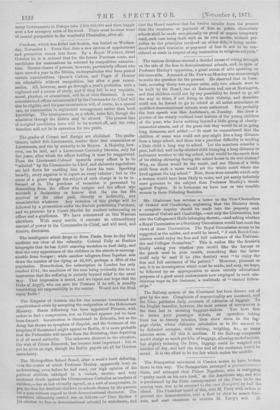The various divisions showed a decided excess of voting strengtlk
on the side of the fees to denominational schools, and, in spite of Professor Huxley's opposition, a great excess of able speaking on the same side. A remark of Mr. Few's on Monday was alone enougia to settle the question for the present. He observed that in Lam- beth, covering thirty-two square miles, only two schools were to, be built by the Board, one at Battersea and one at Newington, and that children could not by any possibility be found to go all, the way to these, if not living in their vicinity, and therefore could not be forced to go to school at all unless attendance at qualified denominational schools were authorized. But probably the best speech was Mrs. Anderson's, on Tuesday. She drew a picture of the utterly confined local horizon of the young children: of the poor, who know nothing beyond a little group of closely- connected streets, and of the great risk they would be at in going, long distances, and added :—" It mud be remembered that the- children of some who could not pay might live a long distance from a large school, and there was a practical difficulty in sending a little child a long way to school. Let the members consider a poor, half-fed, and badly-clothed child tramping a long distance in inclement weather to the big school, what would be the result then of its sitting shivering during the school hours in its wet clothes? Why, an illness would be the result, and one illness of a little child from such a cause would set time whole court where she lived against the big school." Now, those were remarks which only a woman would have been likely to make, and yet surely infinitely. more germane to the subject than Professor Huxley's tirade against Papists. It is fortunate we have one or two sensible- women in these Debating Societies.


































 Previous page
Previous page